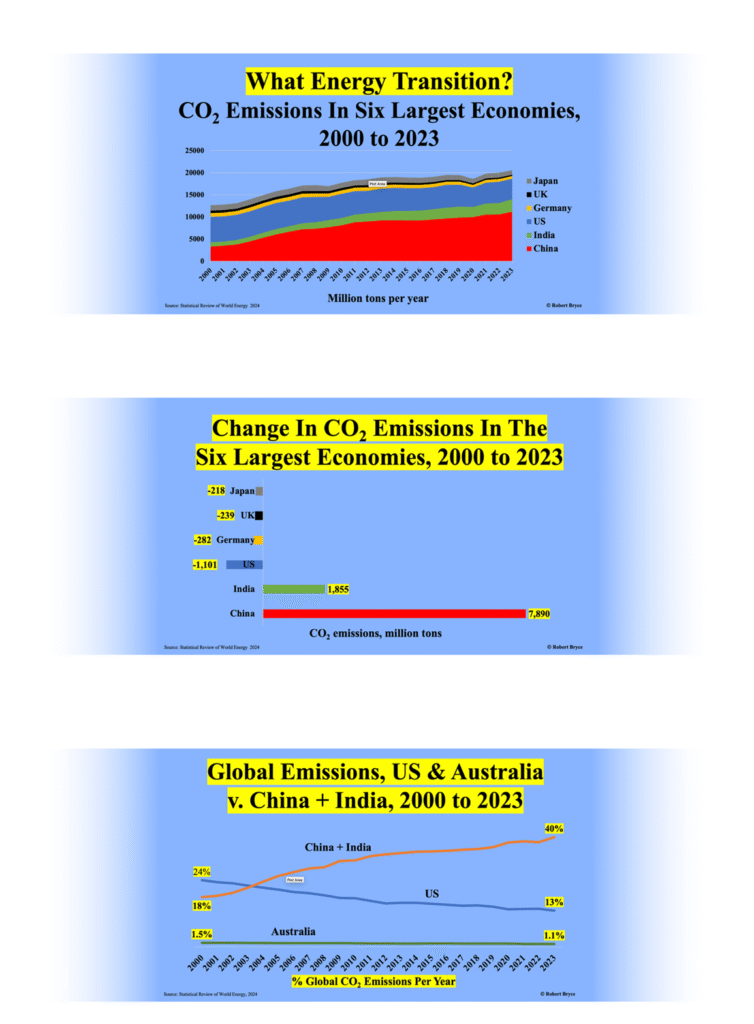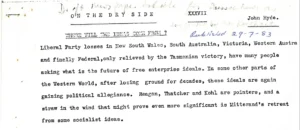Last Monday, American energy expert Robert Bryce shared his perspective on the world’s energy transition and net zero goals. Mr. Bryce argued that current energy policies are economically damaging, globally ineffective, and rooted in unrealistic expectations. Through data and real-world examples, he exposed what he sees as the flaws in the global push toward net zero and why Australia should pull the plug now.
Australia’s Power Price Problem
Mr. Bryce began his address by highlighting a major issue, which affects ordinary Australians: rising electricity prices.
He referred to a Sunday Mail article by John Rolfe which revealed how 450,000 households in South Australia are being charged peak retail electricity rates — even during times when there’s so much solar power in the grid that the wholesale price of electricity drops to zero. Bryce described this as a “power price rip-off”, meaning that despite the surplus of cheap electricity, consumers are still paying high prices for power that isn’t any different in quality from what they’d get from a coal plant or other sources.
While consumers are being hurt financially, government continues to push policies that just don’t make sense.
Global Emissions: It’s About China and India
China and India are the true giants when it comes to emissions growth. Since 2000, these two countries have increased emissions by around 10 gigatons. In contrast, United States has reduced emissions more than any other country — thanks largely to natural gas replacing coal, while Germany spends $1 trillion on renewable energy under the belief it will help the climate. “They are deluded,” Bryce said.
China and India’s continued reliance on coal outweighs any reductions made by Western countries. China is building 204 gigawatts of new coal-fired power plants — six times more than its nuclear investment. India is following a similar path. Together, these nations are investing as much in coal this year as the rest of the world is spending on gas-fired power. China and India burn more coal in a week than Australia does in a year. So, shutting down local coal plants has virtually no effect.

Mr. Bryce noted that Australia’s share of global CO₂ emissions dropped from 1.5% in 2000 to 1.1% in 2023.
“It’s cute that you think you can make a big difference,”
Bryce’s message was clear: emissions aren’t being driven by Australia — they are being driven by our large and energy-hungry partners, and their needs are being met with coal. So why do we keep criticizing ourselves?
Lessons from California and the UK
Since 2008, the state has increased its renewable mandate, aiming for 100% clean electricity by 2045. While wind and solar increased from 3% to 25% of California’s electricity generation, prices rose 3.5 times faster than the national average.

A similar pattern is seen in the UK.
Robert Bryce focused on an analysis from Kathryn Porter (UK-based energy analyst known for her expertise in the energy infrastructure). She explained that household electricity bills are no longer closely linked to wholesale gas prices. Instead, the main reasons prices keep rising are government subsidies for renewable energy and the increasing costs of maintaining and upgrading the electricity network.”
This trend is not limited to California or the UK—it’s happening in Australia too. Since 2008, the share of wind and solar in Australia’s electricity mix has grown significantly and so have power prices.
Our country is energy-rich, yet some people continue to make poor decisions.
Since Albanese took office, spending on climate and net zero initiatives has increased from $1.7 billion to over $9 billion. To put that in perspective, it’s roughly the same amount being spent on Air Force capabilities.
“Absolutely stunning what is happening. But this doesn’t fit the narrative about the energy transition, about net zero, and instead, it’s this hubris.” Bryce said.

You are a superpower, act like it!
Australia has the fourth-largest coal reserves and is the second-largest coal exporter. We export seven times more coal than what we consume — yet we’re closing our coal plants. We export three times more gas than we use domestically. Despite having the world’s largest uranium reserves, we have no nuclear power. Mr. Bryce highlighted that Australia should use its energy wealth strategically rather than dismantle it for symbolic climate targets.
From his perspective, he found the situation “remarkable” and “depressing”. Still, he credited the Institute of Public Affairs (IPA) for pushing back against these trends and encouraging rational energy discussions.
Robert Bryce’s speech was a strong critique of the net zero movement, especially in how it’s being pursued here, in Australia. Current policies hurt consumers, ignore global realities, and waste the advantages of an energy-rich nation.
Australia’s energy decisions may be driven by good intentions, but without grounding them in global context, they risk doing more harm than good — undermining the nation’s economy, weakening its strategic position, and placing an unnecessary burden on everyday Australians.






